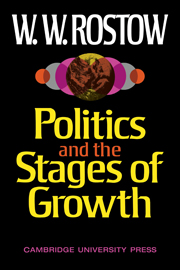Book contents
- Frontmatter
- Contents
- Tables
- PREFACE
- INTRODUCTION
- 1 A way of looking at politics
- 2 Politics in pre-Newtonian societies
- 3 The politics of the preconditions for take-off
- 4 The politics of the take-off and the drive to technological maturity
- 5 American politics: a not so special case
- 6 The politics of the search for quality
- 7 Politics and democracy in the contemporary developing world
- 8 War and peace in the global community
- APPENDIX: The views of others in relation to the approach taken here
- NOTES
- INDEX
4 - The politics of the take-off and the drive to technological maturity
Published online by Cambridge University Press: 16 October 2009
- Frontmatter
- Contents
- Tables
- PREFACE
- INTRODUCTION
- 1 A way of looking at politics
- 2 Politics in pre-Newtonian societies
- 3 The politics of the preconditions for take-off
- 4 The politics of the take-off and the drive to technological maturity
- 5 American politics: a not so special case
- 6 The politics of the search for quality
- 7 Politics and democracy in the contemporary developing world
- 8 War and peace in the global community
- APPENDIX: The views of others in relation to the approach taken here
- NOTES
- INDEX
Summary
INTRODUCTION
The Unfolding of Industrialization
This chapter deals with politics during the first two stages of sustained industrialization itself. Here the primary engine of change becomes internal rather than external. We are dealing with interactions among the economic, social, and political dimensions of society mainly initiated from within, rather than by intrusion, pressure, or humiliation from without.
We examine how industrialization, beginning on a narrow front, proceeds unevenly – but proceeds. As it does so, it sets in motion forces and poses choices and dilemmas whose resolution constitutes a good deal of the political agenda. But now, unlike the situation during the preconditions period, growth itself provides an environment of rising real incomes and increased inputs to government which can be allocated to ease the new pressures generated by the industrializing society. Specifically, we shall try to suggest how certain major policy issues of constitutional equity and justice, of growth itself and welfare, and of national security were thrown up for decision and dealt with as societies began systematically to absorb the backlog and current flow of modern science and technology believed relevant to their economic situation. We shall look at the same illustrative cases as those covered by the historical notes in chapter 3.
The two stages are here dealt with in the same chapter. In economics, sectoral analysis permits the two stages to be quite sharply distinguished. But the rhythms of political life have a timing of their own. They render unrealistic excessively refined linking in time of economic stages and specific political events.
The Take-off
The take-off is a phenomenon limited to relatively few sectors and, often, to limited regions within a nation.
- Type
- Chapter
- Information
- Politics and the Stages of Growth , pp. 98 - 183Publisher: Cambridge University PressPrint publication year: 1971



